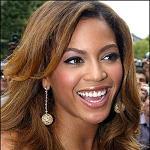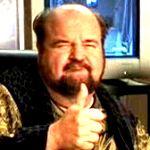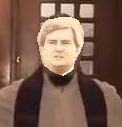You are not logged in.
#31 13.06.2017 21:03
- psykokarkki
- uses and endorses MUOVIKASSI and COMMUNISM ☭

- From: #Mitään UG:tä ei ole olemassa freak "skene"
- Registered: 14.11.2006
- Posts: 104,135
- Website
Re: Lee "Scratch" Perry
no oliks kukaan paikalla?
Offline
#32 05.11.2017 00:56
- hezma
- Vanhempi Käynnissäpitäjä

- From: Helesinki
- Registered: 13.11.2008
- Posts: 17,650
Re: Lee "Scratch" Perry
Tommone on ilmestyny ihan hiljattain: https://www.amazon.co.uk/dp/B074PN7PK4/
Offline
#33 15.03.2019 13:56
Re: Lee "Scratch" Perry
31.5 Ääniwallissa
Vois ehkä.
Offline
#34 18.03.2019 15:12
#35 18.03.2019 15:19
- psykokarkki
- uses and endorses MUOVIKASSI and COMMUNISM ☭

- From: #Mitään UG:tä ei ole olemassa freak "skene"
- Registered: 14.11.2006
- Posts: 104,135
- Website
Re: Lee "Scratch" Perry
Mistähän kulmasta tämän tuotantoon lähtis tutustumaan? Onks mitää boksia?
arkology ainakin, kolmen levyn boksi
Offline
#36 18.03.2019 15:27
- barton_funk
- jamppa, synkkä sienestäjä

- From: Guttenberg-galaksi
- Registered: 05.12.2008
- Posts: 26,592
Re: Lee "Scratch" Perry
dub-triptych
Halusin syväluotaa sitä yhteiskunta-akselien välistä juopaa, joka jo silloin varjosti minua ja minä sitä.

Offline
#37 18.03.2019 15:28
- barton_funk
- jamppa, synkkä sienestäjä

- From: Guttenberg-galaksi
- Registered: 05.12.2008
- Posts: 26,592
Re: Lee "Scratch" Perry
harkitsen lipun hommaamista 
Lähinnä kyllä diggaillut vaan tota alkupään matskua.
Halusin syväluotaa sitä yhteiskunta-akselien välistä juopaa, joka jo silloin varjosti minua ja minä sitä.

Offline
#38 18.03.2019 15:39
- psykokarkki
- uses and endorses MUOVIKASSI and COMMUNISM ☭

- From: #Mitään UG:tä ei ole olemassa freak "skene"
- Registered: 14.11.2006
- Posts: 104,135
- Website
Re: Lee "Scratch" Perry
olishan se kiva legenda vielä nähdä, onhan sillä jo ikää, itse asiassa näköjään ylihuomenna täyttää 83 ja edelleen jaksaa kiertää maailmaa 
Offline
#39 20.03.2019 18:40
- ray charlz
- niin läski äijä

- From: norf norf
- Registered: 14.08.2010
- Posts: 4,207
Re: Lee "Scratch" Perry
hezma wrote:Roast Fish on näistä heikoin.
eri
samaa. helvetin kova lätty.
katsottiin äijien kanssa leffa, äijät lähtivät maustetyttöjen keikalle, itse jäin kotiin kuuntelemaan darkthronea.
Offline
#40 03.06.2019 15:44
- psykokarkki
- uses and endorses MUOVIKASSI and COMMUNISM ☭

- From: #Mitään UG:tä ei ole olemassa freak "skene"
- Registered: 14.11.2006
- Posts: 104,135
- Website
Re: Lee "Scratch" Perry
no oliko kukaan keikalla?
Offline
#41 24.09.2019 10:18
- psykokarkki
- uses and endorses MUOVIKASSI and COMMUNISM ☭

- From: #Mitään UG:tä ei ole olemassa freak "skene"
- Registered: 14.11.2006
- Posts: 104,135
- Website
Re: Lee "Scratch" Perry
no oliko kukaan keikalla?

Here Come The Warm Dreads feat. Brian Eno

Offline
#42 16.10.2019 17:14
- psykokarkki
- uses and endorses MUOVIKASSI and COMMUNISM ☭

- From: #Mitään UG:tä ei ole olemassa freak "skene"
- Registered: 14.11.2006
- Posts: 104,135
- Website
Re: Lee "Scratch" Perry
Here Come The Warm Dreads feat. Brian Eno
Lee Scratch Perry and Brian Eno Share New Song Here Come the Warm Dreads: Listen
Offline
#43 29.08.2021 21:26
- psykokarkki
- uses and endorses MUOVIKASSI and COMMUNISM ☭

- From: #Mitään UG:tä ei ole olemassa freak "skene"
- Registered: 14.11.2006
- Posts: 104,135
- Website
Offline
#44 03.09.2021 15:58
- psykokarkki
- uses and endorses MUOVIKASSI and COMMUNISM ☭

- From: #Mitään UG:tä ei ole olemassa freak "skene"
- Registered: 14.11.2006
- Posts: 104,135
- Website
Re: Lee "Scratch" Perry
beastie boysien muistelua, hieno tarina:
Halloween With Lee "Scratch" Perry
Mike D, Beastie Boys Book: In terms of the way we made records, Lee “Scratch" Perry was one of our biggest influences for sure. I'd explain it like this: Since the first recorded music, most pop and jazz recordings have been made in as simple and straightforward a manner as possible. You have a bass guitar going through a mixing console going to a tape machine. You have drums mic'd up and submixed with few effects, if any. Guitar, vocals, whatever-same. The idea being that you wanted the recorded version to sound as close as possible to the way the music sounded if you were simply sitting in the room while the musicians played it. Fair enough. Lee Perry's approach is the exact opposite: Taking the instrumentation and whatever was being played in the room as the starting point, as his raw materials, he'll then endlessly manipulate and tweak and transform them until they sound nothing like they had in the room, and everything like whatever he has in his head. Usually he does this using some technology or other. Tape delay/echo. A reverb that makes something recorded in a closet sound like it's being played inside a giant hall or stairway. An EQ where you're only hearing a portion of the frequency of whatever is being played. Loops, layering, feedback, speed changes, playing stuff backwards, slapping and pounding on the spring-reverb units until they literally create explosions of sound, and hundreds of other ideas and effects. Instead of aiming for perfect production, Perry sees the raw tracks as merely his paint; and he is the painter, not the musicians. Like a lot of kids my age, I first saw his name on a Clash record. On the band's first LP, they covered "Police and Thieves," a song Perry co-wrote, and he later produced their amazing single "Complete Control." But it wasn't until later, while we were making Paul's Boutique, that we started to buy a lot of dub records. During Check Your Head, we became obsessed with his song "Bushweed Corntrash" by Bunny & Ricky, produced by Scratch. The vocals sound literally otherworldly, swirling around like an alien spacecraft, and so much is happening on Perry's chamber of effects that the listener can't tell which way is up. Perry pushed the production and effects further than we'd imagined possible, and we really wanted to do the same, so his records became a blueprint of how we could get there. When stuck on an idea for a song, we'd ask, "What Would Lee Perry Do?" Even though Grand Royal published a huge cover story about Perry, we didn't actually meet him until 1996. Oddly enough, we bumped into him in Hong Kong and had dinner with him. Perry had a video camera and was filming everything-the people, the buildings, the night sky. After a while he said there was no tape in his camera. I wouldn't say it was your average, normal dinner conversation, like, "Oh, you live in Switzerland. What's your favorite thing about the Alps?" But there was nothing disappointing about meeting this particular idol; his personality was every bit as strange and captivating as his records. Soon after, we were working on the Hello Nasty album at a studio on Downing Street in the West Village. A lot of our material at the time came out of just basically jamming on an idea. We had this one unfinished song that revolved around an organ line by Keyboard Money Mark, a bass line that Yauch played, and a beat I had made with a big kick drum in G-Son's live room with the parquet floor. Perry's productions were always the primary reference for us with that song, but we didn't have what it took to finish it- a vocal idea, a hook, the thing that could take it from a sort-of-idea to an actual song. We tried a couple of directions and nothing really got it there. We liked it, but we couldn't figure out how to finish it. We had our dry-erase board up with a list of all these songs in various stages of construction, and that one just sat there. Then we heard Perry was doing a show on Halloween at a club in Tribeca called Wetlands. Mario Caldato, our co-producer on Hello Nasty, really started pushing - "Lee Scratch Perry's coming to New York; we gotta get him in and see if he has some ideas." Long story short, Perry agreed to give us a few hours between sound check and show time on the night of that Halloween show. The day of the show arrived, and it turned out we'd overlooked one minor detail: Halloween in the West Village is a huge fucking deal. There's always a massive parade. You've got tens of thousands of people, maybe more, dressed to the nines. People of all colors, all persuasions, all preferences, letting their freak flags fly. Sixth Avenue gets closed, and it's very difficult to get around-forget driving. So now we had this very small window of time with Lee Perry, but he basically can't get a cab. So it was decided Yauch and Mario would go down to the World Trade Center, where his hotel was, and bring him back through the thick of the Halloween parade. Yauch and Mario dutifully showed up at the hotel and told Lee and his manager that the only way to get back was to take the train. The manager was immediately like, "What? You're gonna take Lee 'Scratch' Perry on the train? No." But Perry, with his worldly calm, simply said, "It's fine, it's fine." So the three of them took the train. Then they had to walk through the masses of people from the station to the studio. The amazing part is, the way most people dress for Halloween is the way Lee Perry dresses every day. He had rainbow-dyed hair and beard, and was wearing a super-tall baseball hat that was covered in mirrors and broken glass and buttons, and boots to match. Every bit of his outfit was covered in something. He'd stand out 364 days of the year, but he was perfectly camouflaged to walk through the middle of the Halloween Parade in the West Village. After many hours, miraculously they walk into the studio. We played Perry a little bit of what we were working on. We were nervous about it because the song was kind of, uh . . . inspired by him. He could easily have just turned around and said, "Fire burn," and wandered off into the parade. Thankfully, he seemed good with it. We didn't know where to begin, so Mario just started handing him random percussion instruments, and he did several takes playing them. We all had this holy shit fan moment when we realized that it was actually him playing percussion on a lot of his productions-you could just tell from the way he played. Then Mario sheepishly handed him a vocal mic and said, "Here, why don't you try this?" His singing was also revelatory, because we realized that on his productions, it's often his voice. On so many of the records he produced, it's impossible to tell who's singing what, but just hearing his phrasing, we realized how much of it was actually him. All told, we got two to three hours of him in the studio. As sort of out-there as he is, he got it done right? He was a consummate professional. He did what a session player would do if you said, "Here, be Lee 'Scratch' Perry." The track finally had what it needed to become a song, and it ended up on Hello Nasty - "Dr. Lee, PhD." After we finished the session, we still had to get him back to Wetlands in Tribeca. It wasn't actually that far. Maybe a twenty-or thirty-minute walk. In the middle of all this Halloween madness, the seas just parted, and Lee Perry walked right through.
You turned 60 in 1996, did you have a lot of fun working with the Beastie Boys in 1997 during the making of Hello Nasty?
Lee "Scratch" Perry, 2016: It was great, great fun. They were nice Jewish boys and they were clean inside. Very lovely. They called me Dr Lee, PhD because they could feel that I loved them. They were very good boys, wonderful.
Offline
